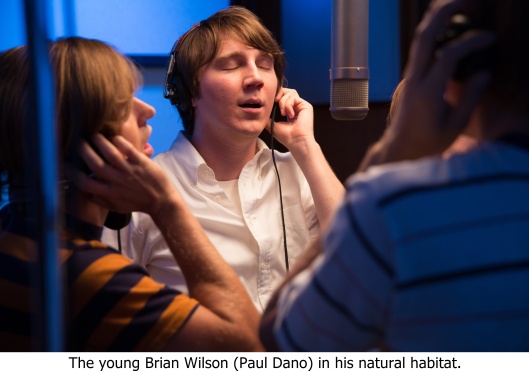Tags
Bill Pohlad, Brian Wilson, Elizabeth Banks, John Cusack, Love & Mercy, Oren Moverman, Paul Dano, The Beach Boys, The Wrecking Crew
There are moments of transcendence in Love & Mercy, Bill Pohlad’s sensational depiction of two discrete chapters in Beach Boy Brian Wilson’s life. When a 1960s era Wilson (Paul Dano) is in the studio recording first Pet Sounds and then Smile, collaborating with legendary studio band The Wrecking Crew and transforming the sounds he can hear in his head into music, his joy is palpable. That makes all the more tragic scenes of a 20 years older Brian—now played by John Cusack—a shambling wreck living in terror of Dr. Eugene Landy (Paul Giamatti), the psychiatrist who controls him. As these two threads weave in and out of the drama, two portraits of Wilson emerge of a young man at the height of his creative powers able to keep the darkness at bay long enough to produce some of a singular decade’s most brilliant music and of an older man practically a walking ghost who finds a foothold in life through the intervention of a wise woman. Love & Mercy is one of the best films of the year.
This is longtime producer Pohlad’s (Into the Wild, 12 Years a Slave) only second directing job in nearly 25 years and with a brilliant assist from screenwriter Oren Moverman, he delivers a remarkably assured feature. In a way, the two sides of Love & Mercy are almost like bookends. The younger Brian’s slide toward mental illness is most obvious when he is home with his family and the other Beach Boys. His house high in LA’s hills is idyllic, but his discomfort in his own skin is apparent at the best of times. At the worst, the glimmers of a bleak near future are only too apparent. He’s stopped touring with the band by now, which can be taken as a sign, but then when he’s in the studio collaborating with the best session musicians in the business, all of that falls away. Wilson’s genius comes to the forefront and so does the happiness that eludes him in everyday life.
By the time Melinda Ledbetter (Elizabeth Banks) meets Brian in the 1980s in the Cadillac dealership where she works, the satisfaction that music gave him has long since evaporated. Landy has separated Brian from his family and his band. The doctor controls every aspect of his patient’s (and meal ticket’s) life, even arranging for chaperones when Brian starts dating Melinda. Medicated out of his gourd, Brian is no shape to protest, but as Love & Mercy morphs into a romantic drama, he has found a fierce advocate in Melinda.
The intertwining of the two parts of Wilson’s story is flawless. If the 1960s Brian’s story has more energy, well, it is the tale of a younger man and it extracts that much more oomph from all of the recording scenes between both Brian and The Wrecking Crew and Brian and the rest of The Beach Boys. The older Brian is slower and a lot sadder with a vulnerability that tugs at Melinda’s heart. Dano and Cusack look nothing alike, but nevertheless are convincing playing the same person. The two Brians possess the same sweetness. The two actors deliver among the finest performances of their careers and so does Banks.
Beach Boys fans will lap up Love & Mercy, and the film certainly adds to the mythology surrounding some of their most iconic recordings. But while the music features heavily in the soundtrack, it is not essential to be familiar with it or even necessarily like it. The drama is about the man, not his art. Love & Mercy delivers what all those old VH1 shows used to promise. It really does get behind the music. –Pam Grady

